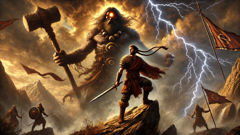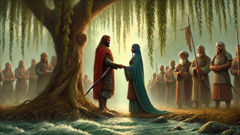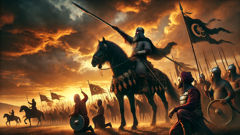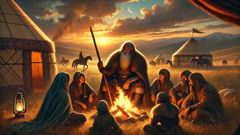Introduction
Across the windswept steppes of medieval Anatolia, where wild horses galloped beneath endless blue skies and eagle shadows glided over shifting grasses, the stories of the Oghuz Turks found their voice. Their world was a tapestry woven with courage and kinship, threaded with the music of the kopuz and the wisdom of elders whose words echoed through the generations. Among them stood Dede Korkut, the legendary sage, bard, and chronicler of their lives. His tales were not just stories—they were living memories, passed from fire to fire, tent to tent, binding the Oghuz together through war and peace, joy and sorrow. The Book of Dede Korkut, a collection of twelve epic tales, immortalizes this world: the challenges of nomadic life, the fierce loyalty to family and tribe, the eternal struggle against fate and foes. These stories are a window into a time when bravery was the highest virtue, honor a guiding star, and the vast steppe both home and battlefield. Each tale crackles with the energy of its people: warriors with hearts as wild as their stallions, women whose resolve matched any blade, elders whose wisdom shaped destinies. As the Anatolian sun set in golden fire each evening, Dede Korkut’s voice rose, blending legend and truth, anchoring the Oghuz soul in a world that was as harsh as it was beautiful. In this retelling, the spirit of those stories endures. The wind still hums through the grasslands, the smoke of campfires curls into star-filled skies, and the Oghuz ride on—undaunted, undivided, unforgettable.
The Challenge of Basat: Shadows on the Steppe
The morning sun rose over the Oghuz encampment, spilling gold onto a world waking from dreamless sleep. The vast plain stretched in every direction—an ocean of grass, alive with the rustle of wind and the songs of skylarks. Here, in a cluster of felt yurts encircled by grazing horses and vigilant dogs, the Oghuz tribe prepared for another day’s trials. Basat, son of Gökçe, awoke with a heaviness in his chest. He was a youth of uncommon strength, broad-shouldered and keen-eyed, but shadows haunted his dreams. Rumors had swept through the camp: a monstrous being, part man, part beast, stalked the far hills, terrorizing shepherds and carrying away their flocks. Children whispered about Goggle-Eye Tepegöz—the dread Cyclops—whose single eye blazed like a burning coal and whose hunger was never sated. In the early chill, Basat visited his father’s tent. Gökçe, his hair silvered by age but his back unbowed, greeted him with a grave nod. 'Son,' he said, 'honor is not given—it is earned. If you wish to stand among the heroes of our people, face this terror with courage, not just strength.' Basat listened, heart pounding. He knelt before his father, receiving the blessing that would send him onto a path few dared tread. 'Go, and take the kopuz of your grandfather. Its music is your shield as much as your sword.'

Armed with a curved sabre and the sacred kopuz, Basat rode from the camp beneath a sky bruised with storm clouds. The wind tugged at his braids, carrying scents of wild thyme and the distant threat of rain. He traveled for hours, crossing rivers swollen with spring melt and hillsides stippled with wildflowers, until he reached the ravaged pasture where the Cyclops had last been seen. There, he found devastation: sheep torn asunder, earth gouged by monstrous footprints, the air thick with fear. He pressed onward, tracking the beast by sign and instinct. As evening descended, he glimpsed movement atop a craggy hill—a hulking silhouette against the dying light. The Cyclops stood as tall as two men, its single eye flickering red as embers. It sniffed the air, nostrils flaring, and roared—a sound that shook stones loose from the cliffside.
Basat did not flinch. He climbed, his kopuz slung across his back, sabre drawn. When he crested the ridge, he called out, 'O Tepegöz! Your reign of terror ends today. I am Basat of the Oghuz, and I challenge you!' The Cyclops laughed, the sound like thunder breaking stone. It charged, wielding a club cut from an ancient oak. Basat dodged, dancing around the monster’s blows, his mind racing. He remembered his father’s words: 'Use not only your strength, but your wit.' As they fought beneath the lightning-riven sky, Basat lured Tepegöz toward a narrow gorge. The beast, blinded by rage, stumbled and wedged itself between two boulders. Seizing his chance, Basat leapt atop its back, driving his sabre deep into its single eye. The Cyclops screamed, shaking the ground, but Basat clung fast, twisting the blade until silence fell. Blood pooled at his feet; victory was his.
Exhausted but unbroken, Basat sat beside the fallen monster and drew his kopuz. He played a mournful melody—a song for those lost to Tepegöz’s hunger, a tribute to courage born of necessity. As dawn broke, he returned to the camp bearing the Cyclops’s club as proof. The Oghuz welcomed him with feasting and praise, but Basat’s heart remained humble. He knew that true strength lay not only in slaying monsters, but in honoring the trust placed in him by his people and ancestors.
The Vow of Bamsi Beyrek: Oath on the River’s Edge
Beyond the high pastures where eagles soared and shepherds watched over their herds, the river ran swift and clear—a silver vein cutting through the Oghuz lands. Here, on a dawn shrouded in mist, two young warriors stood at the water’s edge. Bamsi Beyrek, son of Bay Büre, was famed for his laughter and valor, his voice booming as loud as his sword-arm was strong. Across from him stood Salur Kazan’s daughter, Banu Chichek—her hair braided with blue beads, her eyes fierce with spirit. Theirs was a friendship forged in rivalry, sharpened by challenge. From childhood, they had wrestled and raced, matching wit for wit and strength for strength. Now, as the tribe’s elders watched from a respectful distance, Banu Chichek drew her dagger and carved a mark into a willow’s bark. 'Whoever wins today’s contest,' she declared, 'shall claim the other’s vow.'

The challenge was fierce. They wrestled on the damp grass, neither yielding ground. When Bamsi finally toppled Banu Chichek, she sprang up laughing, brushing mud from her tunic. 'Your strength is great,' she said, 'but let’s see if your heart is as true.' She set a bow in his hand and pointed to a falcon soaring high overhead. Bamsi nocked an arrow, drew, and let fly—a perfect shot that clipped a feather from the bird without bringing it down. Banu Chichek clapped her hands, delighted by his skill. At last, she placed her hand in his. 'We are bound now, by oath and honor. Should one fall, the other will avenge or mourn.'
Their joy was short-lived. Raiders from a rival tribe swept down like wolves, taking Bamsi captive as he protected Banu Chichek. He was bound and carried across the river, his voice echoing out in defiance even as he vanished into the morning haze. Days passed. Banu Chichek mourned but did not despair. She sought Dede Korkut’s counsel; the old bard listened to her tale, stroking his white beard, and spoke: 'Oaths are not chains—they are wings. Let your courage guide you.' With her father’s blessing, she disguised herself as a boy and set out to find Bamsi.
Through forests tangled with wild rose and mountain passes scoured by snow, Banu Chichek tracked the raiders to their stronghold. At night, she crept past sentries and found Bamsi imprisoned in a timber cage. He was battered but unbeaten, singing the old Oghuz songs to keep hope alive. When he saw her, his eyes shone with pride. Together, they fashioned an escape: Banu Chichek bribed a guard with honey-cakes and hid Bamsi beneath her cloak as dawn broke. Their flight was perilous; dogs barked, arrows whistled past, but their hearts beat in unison. They crossed the river on horseback, the morning sun gilding the water as they rode side by side.
The Oghuz rejoiced at their return. Bamsi Beyrek and Banu Chichek stood before the tribe, their hands entwined, renewing their vows before Dede Korkut and the gathered elders. 'Courage is not only the might of one’s arm,' Dede Korkut intoned, 'but the faith that binds two souls in trial and triumph.' Their story became legend, sung on long winter nights and whispered as blessing at every new union.
Salur Kazan’s Last Stand: The Siege of the Steppe
The Oghuz tribes knew peace only as a fleeting guest. One year, when the grass grew tall and wildflowers painted the plains in riotous color, a threat unlike any before swept toward their lands. The Kara-Khan, lord of the western marches, had gathered an army of iron-clad riders and black banners, intent on breaking Oghuz strength forever. News reached Salur Kazan—chieftain, tactician, father—by way of a breathless scout. The camp bristled with tension as Kazan gathered his council beneath the old cedar tree. Dede Korkut presided with grave composure; the young warriors, Basat and Bamsi Beyrek among them, stood ready.

Kazan spoke plainly. 'We have only each other and the land beneath our feet. The enemy is many; we are few. But courage weighs more than numbers.' A hush fell. Then he called upon each hero to declare their loyalty. The Oghuz responded with fierce shouts, their voices echoing across the plain. Women sharpened blades and mended armor; children fetched water and whispered prayers. That night, flames leapt high as the tribe feasted in unity—knowing tomorrow could bring doom or glory.
At dawn, black banners darkened the horizon. The Kara-Khan’s forces advanced in a churning mass of hooves and steel. Kazan rode at the head of his warriors, his black mane streaming behind him, his spear glinting in the early sun. The two armies crashed together with a sound like worlds colliding. Dust rose; arrows fell like rain. Basat cleaved a path through enemy lines; Bamsi Beyrek’s laughter rang wild as he fought back to back with his beloved Banu Chichek. Salur Kazan wielded his spear with calm fury, felling foes with every stroke.
But numbers pressed hard. The Oghuz were forced back toward their tents. Then Kazan devised a stratagem: as dusk fell, he ordered torches set to the dry grass upwind of the Kara-Khan’s lines. Flames leapt high, smoke rolling thick and black. Confusion spread among the invaders; horses panicked, riders lost formation. The Oghuz struck like thunderbolts from the smoke, scattering their enemies in a desperate charge. In the chaos, Kazan faced the Kara-Khan himself atop a blood-soaked hillock. Their duel was brutal—sword against sword, will against will.
Kazan staggered with a wound to his side, yet pressed on. With one final surge, he swept aside the Khan’s guard and struck him down before the eyes of both armies. The Kara-Khan’s banner fell; his men broke and fled. The Oghuz stood victorious, battered but unbowed. That night, under a sky ablaze with stars, Dede Korkut sang of Salur Kazan’s valor and sacrifice. Though wounded, Kazan lived to see his people safe. His tale joined those of Basat and Bamsi Beyrek—a testament to unity and undying courage on the steppe.
Conclusion
The Book of Dede Korkut endures because its stories are more than ancient legend—they are living testament to values that shaped an entire people. In the echo of Basat’s courage against monsters, Bamsi Beyrek and Banu Chichek’s unbreakable oath, and Salur Kazan’s indomitable will, we see not just heroes of the past but reflections of virtues that remain timeless: honor, kinship, cleverness, and hope. These tales ripple outward across centuries, inspiring generations from Anatolia to far beyond, reminding us that adversity tests but never diminishes the human spirit. As long as the wind sings across the steppe and fires burn bright in the night, Dede Korkut’s voice will guide those who listen—binding past to present, legend to life.













